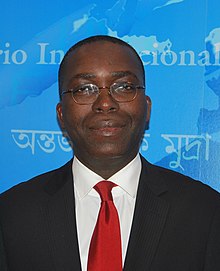Augustin Matata Ponyo
| Augustin Matata Ponyo | |
|---|---|
 |
|
| Prime Minister of the Democratic Republic of the Congo | |
|
In office 18 April 2012 – 17 November 2016 |
|
| President | Joseph Kabila |
| Preceded by | Louis Alphonse Koyagialo (Acting) |
| Succeeded by | Samy Badibanga |
| Minister of Finance | |
|
In office 21 February 2010 – 12 April 2012 |
|
| Prime Minister |
Adolphe Muzito Louis Alphonse Koyagialo (Acting) |
| Preceded by | Atanase Matenda |
| Succeeded by | Henri Yav Mulang |
| Personal details | |
| Born |
5 June 1964 Maniema, Congo-Léopoldville (now Congo-Kinshasa) |
| Political party | People's Party for Reconstruction and Democracy |
| Alma mater | University of Kinshasa |
Augustin Matata Ponyo Mapon (born 5 June 1964) is a Congolese political figure who was Prime Minister of the Democratic Republic of the Congo from April 2012 to November 2016. Previously he served as Minister of Finance from February 2010 to April 2012; as Prime Minister, he retained responsibility for the finance portfolio.
On 12 February 2012, while serving as Finance Minister, Ponyo was seriously injured in a plane crash near the town of Bukavu. Other victims of the crash included the ex-President Director General of OGEDEP (Office de Gestion de la Dette Publique) and national deputy for the district of Lukunga Oscar Dimageko Gema (who died two weeks after the crash), the roving ambassador of President Kabila and former Minister of Foreign Affairs Antoine Ghonda (who survived), former Governor of Katanga Province and President Kabila's closest advisor, Augustin Katumba Mwanke (who died during the crash), and the Governor of South Kivu, Marcellin Chishambo (who survived with a minor leg injury). On 14 February 2012 it was reported that he had been flown to South Africa for treatment.
On 18 April 2012 he was appointed as Prime Minister by President Joseph Kabila.
He visited Beni after the massacre there, and was booed by hundreds of people. Violent protests then broke out which resulted in the deaths of three people.
He resigned as Prime Minister of the Democratic Republic of the Congo on 14 November 2016, as part of a African Union-backed national dialogue framework agreement which specifies an opposition leader takes the position of Prime Minister.
...
Wikipedia
